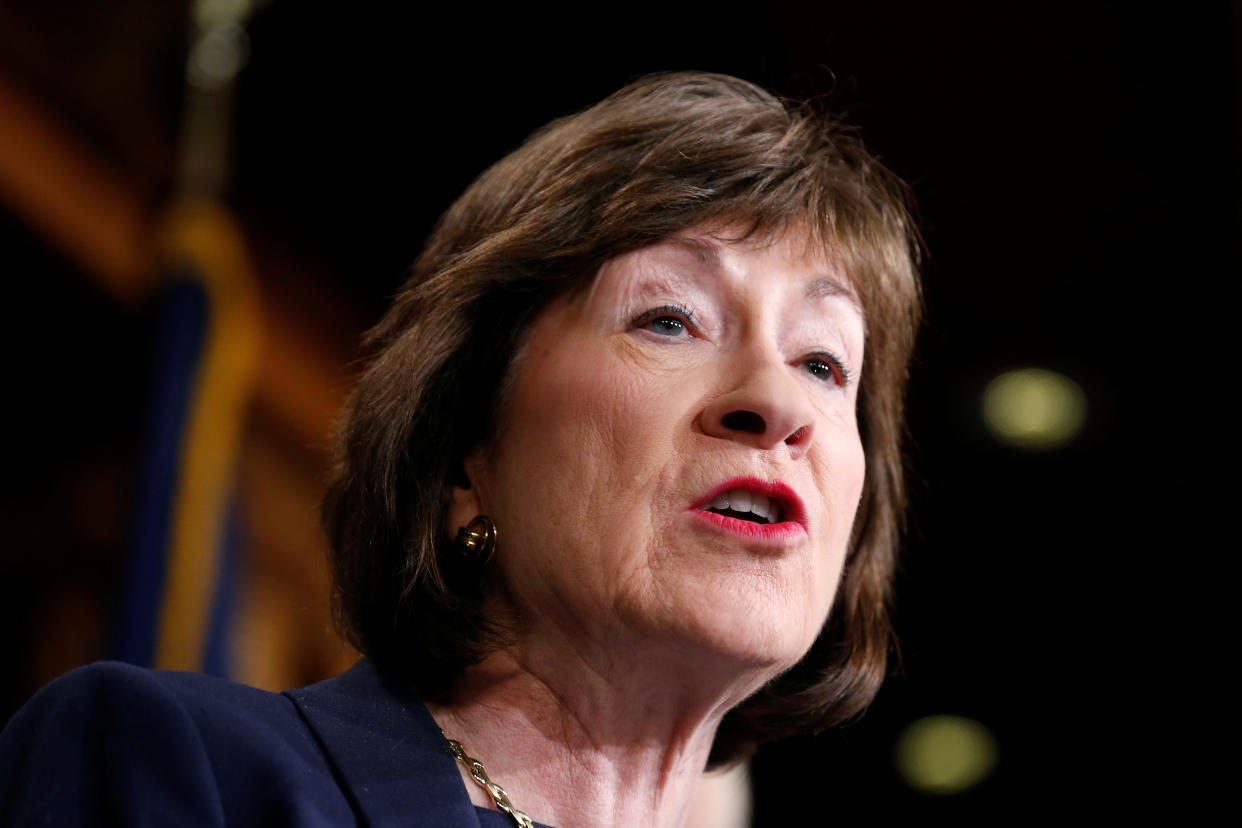Susan Collins of Maine is the last New England Republican in Congress. But for how long?

Sen. Susan Collins of Maine stands as the only Republican in Congress who represents a state in New England, once a solid GOP redoubt. She has served in the Senate for 22 years, but her opponents hope one vote can pull her down — the one she cast for Brett Kavanaugh.
Maine’s House Speaker Sara Gideon kicked off her campaign to defeat Collins on Monday. In her campaign video, Gideon criticizes Collins’s vote to confirm Kavanaugh to the Supreme Court as a threat to abortion rights.
In October, Collins defended the judge against allegations of sexual misconduct in a 30-minute speech on the Senate floor.
“Susan Collins’s vote to put Brett Kavanaugh on the Supreme Court may be paying off for her, but it’s put women’s control over their own health care decisions in extreme jeopardy,” Gideon says in the video.
Gideon was referring to Collins’s record campaign fundraising after the Kavanaugh vote. Collins raised $1.8 million in the final quarter of 2018, the highest haul of her career. On the other side, an online crowdfunding campaign has raised $4.1 million since October to fund Collins’s eventual Democratic challenger.
I’m running against Susan Collins for U.S. Senate because Mainers deserve a senator who will always put our state first. Let's build this campaign together. Will you join us? ➡️ https://t.co/mcihP9UtNE #MESen #MEpolitics pic.twitter.com/1SbV0MbMKM
— saragideon (@SaraGideonME) June 24, 2019
The money will be used to support the winner of Maine’s Democratic primary in June 2020. The $4.1 million nearly matches the amount Collins’s campaign had on hand at the end of first quarter, but she will likely have raised much more by the next filing deadline in July.
As Democratic presidential candidates embrace universal health care and other progressive policies, the party’s agenda increasingly hinges on winning a majority in the Senate. Democrats see the potential to pick up seats in states like Maine that leaned left in the 2018 midterms. Collins is also one of two Republican senators up for reelection in states Hillary Clinton won in 2016.
The other is Sen. Cory Gardner of Colorado who was narrowly elected in 2014 with 48 percent of the vote.
Gideon has served in Maine’s legislature since 2012, representing a liberal suburb of Portland that supported Clinton in 2016. Gideon’s campaign Twitter account gained more than 55,000 followers after it was created on Monday. Her campaign video touts her recent legislative accomplishments, including bills to protect health care for people with preexisting conditions and to lower prescription drug costs.
Betsy Sweet, another Democrat challenger, has similarly portrayed Collins’s support for Kavanaugh as a threat to abortion rights in her campaign speeches. Sweet failed in 2018 to win the Democratic primary in Maine’s governor race. Both Gideon and Sweet have pledged not to accept money from political action committees as they attack Collins for taking donations from corporations.

A recent poll by Maine-based Critical Insights found that only 41 percent of Mainers approved of Collins in spring 2019. That represents a 10 percent drop from fall 2018. Only 46 percent of Republicans said they approved of Collins’s job performance.
The Critical Insights poll differs significantly from Morning Consult, which showed Collins with 52 percent approval, and a Pan Atlantic Research poll that showed her with 62 percent approval. All three polls were conducted in spring 2019.
David Farmer, a Democratic political consultant in Maine, told Yahoo News that support for Collins in Maine is stronger than the Critical Insights poll suggests, although the Kavanaugh vote has damaged her standing with progressive Democrats, he said.
“Senator Collins’s vote for Kavanaugh and some of the tepid reaction she’s had around President Trump leads folks to believe she’s in a different position than she’s been in before,” Farmer said.
Over her career, Collins has crafted an image as a moderate Republican who votes her conscience. That matters in Maine, a state with a history of electing independent-minded candidates. Collins’s Senate colleague Angus King is an independent who caucuses with the Democrats. King replaced Olympia Snowe, a Republican who was known for bipartisanship.
Gideon is capitalizing on the perception that Collins has become less moderate. Her campaign video criticizes Collins’s vote for the 2017 Republican tax plan, featuring a clip of Trump thanking the senator for her vote.
“Susan Collins has been in the Senate for 22 years,” Gideon says in her campaign video. “And at one point, maybe she was different than some of the other folks in Washington, but she doesn’t seem that way anymore.”
By one metric, Collins has been ranked as the most bipartisan senator for six consecutive years. The Lugar Center at Georgetown University bases its Bipartisan Index on the number of bills sponsored or co-sponsored with members of the other party. Based on her voting record, Collins is the most liberal Republican in the Senate.
During the two-year period when Collins voted for the Republican tax overhaul and for Kavanaugh’s nomination, she was twice as likely as the average Republican to vote against the party majority, according to data from ProPublica. In 2017, she was one of three Republican no votes on the party’s attempt to repeal the Affordable Care Act.

In March, Collins helped Democrats block Trump’s declaration of a national emergency along the southern border with Mexico. Collins also voted against the judicial nominations of Wendy Vitter, who once moderated a panel called “Abortion Hurts Women’s Health,” and Matthew Kacsmaryk, who has opposed same-sex marriage and protections for LGBT people.
Planned Parenthood gave Collins an award in November 2017 for her support of health care and women’s rights. Collins has defended the organization in the past by voting against bills that would pull federal funding. But less than a year after honoring her, Planned Parenthood’s political wing condemned Collins over her support for Kavanaugh.
Other votes have also gained the attention of pro-choice advocates. Collins has confirmed at least 32 Trump judge appointees who personally oppose abortion rights, according to research by NARAL Pro-Choice America and the Democratic political action committee American Bridge.
Amy Fried, a professor of political science at the University of Maine, said Collins is unlikely to get the same support from Democratic and independent women as she did in 2014. But Collins has more than a few votes to spare based on the wide margins of her previous elections, Fried said.
“I still think it would be tough to beat Susan Collins,” Fried said. “She’s run number of times, she’s done very well in recent elections, and she has a very good campaign operation.”
Collins won her last election in a landslide over Democrat Shenna Bellows, with 68.5 percent of the vote. She also won handily in 2008, when Democrats took the White House and both houses of Congress. John McCain, the Republican presidential nominee, lost in Maine with 40 percent of the vote. Collins crushed her Democratic challenger with 61 percent.
Like the state’s politicians, Maine voters also tend to be independent, with a larger share of unaffiliated voters than those of both of the major parties. CNN exit polls from Maine’s 2014 Senate race showed that 39 percent of Democrats cast ballots for Collins. While a majority of Democrats voted for Bellows, Republicans and independents together made up a much larger bloc at 69 percent of total voters.
Josh Tardy, a Republican who previously served as Maine’s House speaker, said Collins “transcends partisan politics” by appealing to middle-of-the-road voters. He doesn’t think the senator’s vote for Kavanaugh, or any single issue, will cost her the election. Tardy said some voters will even appreciate how Collins handled the Kavanaugh vote.
“For most folks that aren’t completely leaning to one partisan ideology or another, they really look at the diligence and thoughtfulness and approach the senator made in a very public and under-the-microscopic process,” Tardy said.

Another vote (beside the Kavanaugh confirmation) criticized by Democrats was Collins’s support for the 2017 Republican tax overhaul that gave the largest breaks to wealthy Americans and corporations. In past elections, Collins’s Democratic challengers have attempted to tie Collins to unpopular policies of the president. In 2002 and 2008, Democratic challengers criticized her support for President George W. Bush’s tax bills.
Mike Leavitt, a former executive director of the Maine Republican Party, said Collins is in good shape for reelection. “If you go down issue by issue, a person may or may not agree with every vote she’s ever taken but they respect her independence and her candor and the fact that she’s authentic,” he said.
Collins also has a challenger from the right. David Levasseur, a pro-Trump conservative blogger, has questioned the senator’s loyalty to the Republican Party and attacks her for being pro-choice. Levasseur recently suggested on Facebook that Collins’s evident lack of enthusiasm for Trump might hurt his chances of winning the state next year.
“That creates a unique problem for the senator, who needs to get through a primary with an unknown challenger on the right but also needs to separate from President Trump to give her some room in the general election,” Farmer said.
The November 2020 general election is 16 months away. Farmer said Collins will have the opportunity to appease — and to displease — both parties in Senate votes before then. Trump is currently unpopular in Maine, with only a third of voters approving of the president, according to the spring 2019 Critical Insights poll.
In 2016, Collins published an op-ed announcing that she wouldn’t vote for Trump, detailing his “unsuitability for office.” She hasn’t said if she will support his reelection campaign.
While her opponents call into question her moderate label, Collins finds herself in familiar territory — the middle. The president’s policies — and Collins’s reactions to them — are likely to dominate a race where she is being attacked for being too Republican and for not being Republican enough.
_____
Read more from Yahoo News:


